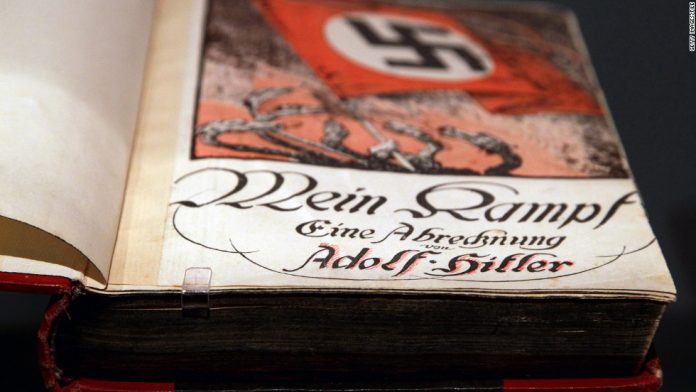
Adolf Hitler’s “Mein Kampf” is allowed, but an illustrated history of World War II isn’t. A 700-page defense of racial segregation is fine, but not Langston Hughes’s poetry.
Kinky paperback memoir? No problem. Suggestive Shakespearean sonnets? No way.
Welcome to the Texas Department of Criminal Justice, home to 140,000 prisoners and a list of 15,000 banned books.
The state’s prison system, which is the largest in the country, has been repeatedly criticized for censoring books for what detractors say are arbitrary reasons. Among the latest to be added to the scroll of offending material is “Wolf Boys: Two American Teenagers and Mexico’s Most Dangerous Drug Cartel” by Dan Slater, which TDCJ banned before it even hit the shelves this month.
The book is a narrative nonfiction thriller that tells the story of two American teens who wind up working as assassins for the Zetas, Mexico’s notorious drug cartel, and are later charged and sentenced to prison in Texas.
Slater, a former Wall Street Journal reporter, said in an essay for Slate this week that three years ago he began corresponding with one of the subjects, Gabriel Cardona, who is serving a life sentence for his crimes as a member of the cartel. During that time, Slater said, he sent Cardona a number of books, including “River of Doubt” by Candice Millard and “Dreams from My Father” by President Barack Obama.”
Slater also sent “Wiseguy: Life in a Mafia Family,” the true crime account of a Brooklyn gangster that formed the basis of the movie “Goodfellas.” But prison officials rejected it, saying it violated TDJC prohibitions on materials involving “crime schemes.”
Last month, they banned “Wolf Boys” on the same grounds, citing a passage that describes a drug smuggler packing drugs into the panels and lights of a pickup truck, Slater said.
Already familiar with the “criminal schemes” prohibition, Slater said he saw the decision coming.
“The tragic tale of Gabriel Cardona and his childhood friends reflects the experiences of thousands of kids living along the border, and scores of young inmates across the Texas prison system,” Slater wrote. “But because that experience entails life in a criminal underworld, inmates cannot, perforce of TDCJ’s book-banning policy, read about what landed Gabriel and his associates in prison.”
A spokesman for the Texas prison system told the Guardian that “Wolf Boys” was banned because of a page that “contains information on how to conceal and smuggle illegal narcotics.”
TDCJ’s decision on “Wolf Boys” came just ahead of the American Library Association’s Banned Books Week, which started Sunday and highlights books that are frequently censored in schools and libraries around the country.
“It’s truly tragic,” Deborah Caldwell-Stone, deputy director of the American Library Association, told the Los Angeles Times. “There is probably a new story every day like this.”
A 2011 report by the Texas Civil Rights Project outlines the process by which the TDCJ decides which books can enter a prison. According to the report, a mailroom officer checks the book against a “master list” of publications that are permitted. If the book is on the list, the prisoner can have it. If not, the mailroom officer reviews it for “objectionable” content. All prisoner appeals are referred to the agency’s headquarters in Huntsville, Texas.
The report says there are six criteria for determining whether a book should be banned. Some are crystal clear — a book can’t come into a prison if it contains contraband or information about making explosives, drugs or weapons. But others are a bit more subjective, particularly the third criteria, which states that a prison can nix a book if it’s deemed to have been written “solely for the purpose” of achieving “the breakdown of prisons.”
TDCJ has used that last clause to ban dozens of books about civil rights and books that use the N-word, according to Slater. Among them: Langston Hughes’s poetry, a book about Jackie Robinson and the Brooklyn Dodgers, Salman Rushdie’s “The Satanic Verses,” and The Narrative of Sojourner Truth.
Other books on TDCJ’s list of literary contraband include former Senator Bob Dole’s “World War II: An Illustrated History of Crisis and Courage;” Jon Stewart’s “America (The Book): A Citizen’s Guide to Democracy Inaction;” “Shakespeare and Love Sonnets” (because it had nudity on the cover); and “The Color Purple” by Alice Walker, according to the report.
TDCJ also bans, perhaps most ironically, “It Can’t Happen Here” by Sinclair Lewis, a novel that describes the fictional election of a fascist president in the United States who imposes totalitarian rule on the country. “Mein Kampf,” on the other hand — which laid the groundwork for an actual fascist takeover in a democratic country — is fair game.
“TDCJ has let its book-banning policy go far beyond what is necessary, permitting uneducated mailroom officers and Huntsville administrators to censor speech on political grounds or simply block books from going to inmates that prison workers do not like,” Slater said. “If what matters is balancing security with free speech and the rehabilitation of inmates, no policy could be more errant.”
(c) 2016, The Washington Post · Derek Hawkins

